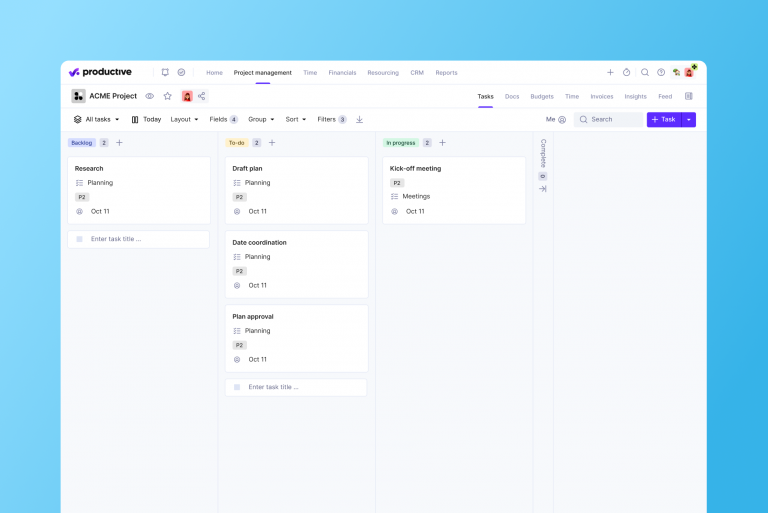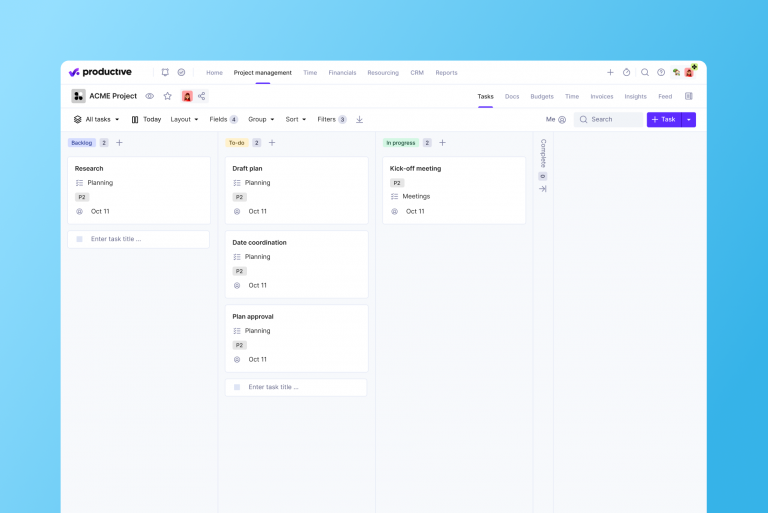How to Improve Time Management in Your Agency

The importance of time management in the agency world is evident.
We Help Your Agency Reach New Heights
Switch from multiple tools and spreadsheets to one scalable agency management system.
Effective time management is the basis for good utilization rates, which is the foundation of growing your agency’s profitability. And not only that. You can’t invoice projects without having timesheets filled out. You can’t look at insights in real time without your employees tracking their hours on a daily basis. You can’t even properly plan resources to forecast your agency’s revenue without knowing where your agency’s time is being spent.
But if you’re a project manager reading this, you already know all this. The real issue is how to motivate employees to track their time.
With that said, we’re not here to talk to you so much about the importance of time management. We’re here to provide a rationale that can help you empower your teammates, rather than you having to chase them down to track their time. Questions like: why is time management important and how to improve time management in my agency? How do I motivate my teammates to actually like using our time management software?
See also: 13 Best Agency Time Tracking Software
Let’s have a look at proven time management strategies and time tracking tips for agencies.
Why is Time Management Important In an Agency?
Here are three bulletproof reasons for employees to understand the importance of time management and time tracking in an agency.
1. Better time tracking leads to better resource management.
Picture this. You land a new deal. Your team is starting to work on a new project. You begin to plan your resources and map out everyone’s schedule. You say Person A will work 20 hours, and you trust it’ll take Person B 30 hours to complete their part for this particular job. As they work, they start tracking their time. All the while, as the project manager, you’re trying to figure out if they are managing their own time well so that your utilization rates are looking good and that your project is nearing delivery.
Effective time management leads to more accurate time tracking. You can’t plan work if you can’t measure the time it will take, and you can’t measure time accurately if you’re not managing your time well. It’s a two-way street. The more transparent you are about your expectations and the more honest your teammates are about how they plan to manage their time and how their work is moving forward, the easier it will be to keep planning and adjusting to new demands.
3. Effective time management will improve managing your agency’s overhead costs.
If your agency’s struggling with getting real-time insight into your company’s financial situation, you’re not the only one. When you aren’t allocating your teammates’ time effectively, your agency is losing money. But what about your finance, marketing or office management teams? Their hours may be non-billable, but these are the type of employees who should still track time on internal projects. Their work, though non-billable, should be seen as agency expenses that we call overhead.
Learn more about how to calculate overhead costs for your agency.
How to Improve Time Management in Your Agency
It’s key is to cultivate a sense of ownership and responsibility for the mundane yet extremely important task of time tracking. If you already encourage open communication in your agency and keep your teammates in the loop on your budgets and your numbers—time tracking should be less of a burden for your teammates. In case you’re in the process of shifting your way of working, here are some of our tips on how to improve time management and time tracking in your agency.
1. Switch from a corporate perception to a perception of responsibility and ownership.
Instead of making team members feel micromanaged, aim to enhance ownership and responsibility. Empower your teammates by letting them in on strategy whenever you can. Give them a sense of ownership. Let them in on client expectations and why you’re doing things. Ask employees for their opinions and feedback on resource management, like: “Is the time estimate for this project accurate? Will we be able to finish within the given timeline?”
2. Break big tasks into manageable hours and set up automatic time tracking.
Maybe your teammates find obstacles in effective time management because they often find themselves in so-called task paralysis. It doesn’t have to be that way. Have them scheduled on longer periods of deep work so they can focus better.
That way, if they’re working on bigger chunks of work and not switching between projects too much on a daily basis, automatic time tracking will ease the pain of them entering the same data each day.
You can even integrate Productive with your Google Calendar. Track time in the Calendar view and turn your calendar events into time entries. Define the exact time in a day when a time entry was recorded and see your time entries in the day or week view.
3. Streamline your agency processes whenever you can.
Though one of your goals is to streamline processes so that your agency can get better utilization rates, it’s unrealistic to expect you’ll be able to streamline everything. After all, each project brings new and different challenges.
To improve overall time management and time tracking in your agency, you should still aim to copy and paste your best practices. Schedule all the predictable hours your teammates will need to complete and set up automatic time tracking. This makes time tracking much faster for employees by letting them pick those already scheduled hours suggested to them in their timesheets.
How to Use Time Management Software to Track Time in Your Agency
Using software for agencies is the best way to improve time management and time tracking in your agency.
What’s the best way to track time in an agency?
The ideal way to track time is multiple times per day (i.e. as the work gets done), or at the end of each work day. This will let you see your utilization and profit insights in real time.
If you can’t get all your teammates to track time on a daily basis, they can get time tracking reminders on their email the next day. That will give you data that’s a day old. Not ideal, not that bad, either.
With the rise of remote work and distributed teams, your employees may be working in different time zones or in shifts. As long as they track time at the end of each day (or latest the next day), you’ll have as recent data as possible.
What’s the worst way to track time in an agency?
Using a Software For Agencies to Effectively Manage Time and Get Time Data
Whether you’ll end up implementing automatic time tracking in your software for agencies or getting your teammates to track time daily on their own, knowing where your agency’s time is going is crucial for your success. For more tips on time tracking and getting real-time utilization data, reach out to us at sales@productive.io.



